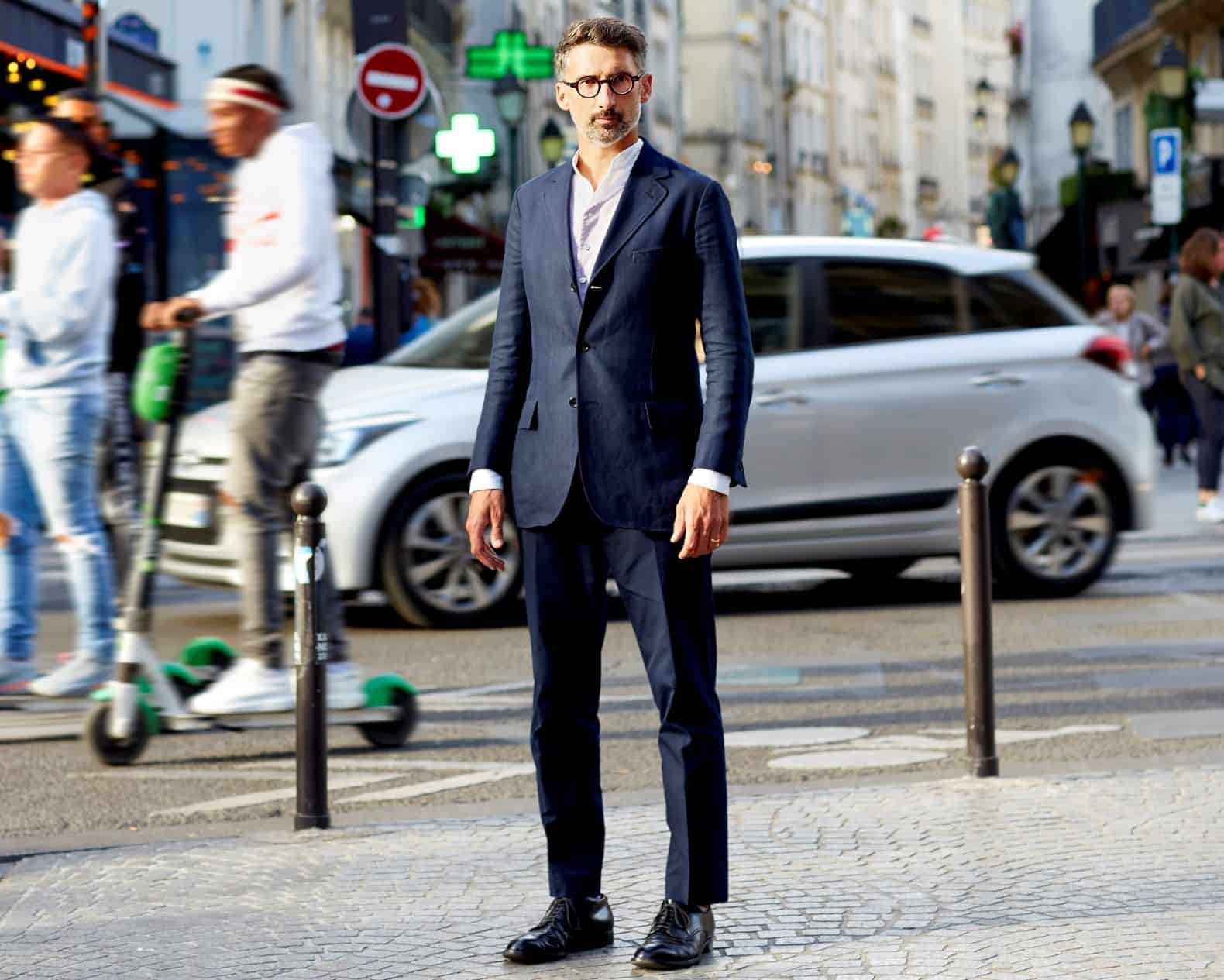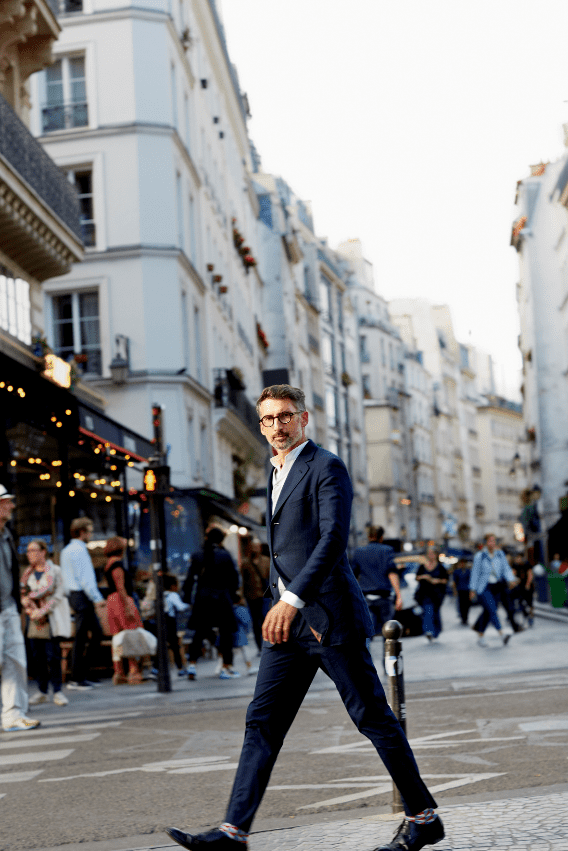Julien Dossier: “We need a mobility paradigm shift.”

Julien Dossier (H.95), founder of Quattrolibri, a consultancy specializing in ecological transition strategies, teaches classes at HEC on the challenges of making cities sustainable and just published Ecological Renaissance: 24 Projects for the World of Tomorrow (Renaissance écologique: 24 chantiers pour le monde de demain, Editions Acte Sud).

© Sandrine Expilly
“Flygskam”, or being ashamed of taking a plane, is certainly the word of the year in 2019. In general, the transport industry seems to be out of step with ecological transition. Is this sector particularly lagging behind?
Julien Dossier: The transport sector is one of the top contributors to carbon emissions, almost equal to the food and construction industries. This sector, which is largely dependent on hydrocarbons, needs to be transformed from top to bottom. “Flygskam” is specifically concerned with air travel, which simply has no place in the transition to carbon neutrality. There’s no magical solution: most of the planes that will be in service in 2050 already exist. Hybrid or solar-powered planes will have only a marginal impact. What we must do is to reduce demand. Taking a plane to spend a weekend on the beach in Morocco is completely aberrant from an ecological point of view.
Why is the year 2050 significant?
Julien Dossier: The Paris Climate Accord calls for a maximum temperature rise of 2°C. To reach that goal, we must achieve carbon neutrality by 2050 at the latest.
Different modes of transport have different effects. Trains, for example, produce less CO2 than planes or boats…
Julien Dossier: Trains produce 1,500 times fewer carbon emissions than planes. Train travel is far from environmentally friendly, however. High-speed trains, for example, have a disastrous effect on biodiversity and consume enormous amounts of energy. The top priority must be to revitalize daily transport by increasing the number of local lines, the RER, and linking them to inter-city services.
Who are the good guys in the transport sector? What are some of the praiseworthy companies?
Julien Dossier: The picture is bleak. We need a complete mobility paradigm shift. It’s urgent that we respond right away before even considering technological innovations that might make our offerings better. Our goal must to reduce the ratio “resources x kilometres/number of passengers”. Otherwise we will never achieve carbon neutrality.
“Europe, which is focusing on transforming existing vehicles into electric ones, is missing the boat on native electric…”
What do you advise, specifically?
Julien Dossier: First of all, we need to optimize our use of vehicles. In France, there’s an average of 1.2 people in every car on the road. We could easily double this ratio and in doing so divide in half the amount of greenhouse gases being produced. We need to make carpooling the norm. We also need to cut down on the distances people have to drive by making sure that employment zones are located near residential zones. The La Défense business district in Paris, for example, draws workers to the same place at the same times, from Monday through Friday. Instead of renovating the skyscrapers there, which are bottomless pits of energy consumption, why not establish teleworking centers all over the Paris region? Salaried workers would only have to go to La Défense one or two days a week, and then we would only need a third of the skyscrapers. The skyscrapers no longer in use could be turned into automated storage facilities and covered with solar panels. That would be an investment that would really be productive. Certainly much more so than the Eole subway line (note: the extension of Line E of the subway system to La Défense), which will probably be completely saturated from the moment it goes into service.
Your plan concerns much more than transport.
Julien Dossier: Yes, local organizations, companies and citizens must work together if we’re going to reach our goals. Mobility cannot be separated from urban development and land-use planning. These are long-term efforts which require everyone’s support.
How can transport companies be convinced to be more environmentally friendly?
Julien Dossier: By making them pay for the real costs of their activities. To take the example of road transport, heavy-duty trucks have a considerable impact on the state of roads, but they do not contribute to maintaining these roads. If these “negative external effects” had to be included in their prices, long-distance truck transport would be much more expensive, which would result in a growth in local consumption. I would also like to see certain vehicles banned, for example personal vehicles weighing more than two tons. We are now able to produce cars weighing only 500 kilos that can transport up to five people! Making lighter-weight vehicles is a virtuous circle: the lower the weight, the less energy is consumed, so less battery power is needed, resulting in reduced weight and lower investment costs.

In an era when SUVs and four-wheel-drive vehicles are more popular than ever among drivers, the electric car is having trouble attracting buyers. Do we need to create new incentives for purchasing electric vehicles?
Julien Dossier: Instead of creating more incentives for using electric cars, why not ban hydrocarbon-powered cars? Why allow for sales of anachronistic, fuel-guzzling four-wheel-drive vehicles? Even the Clio, the C2 and the C3 are too heavy. We need to promote lighter vehicles that consume very little. Take a look at the France Stratégie report on the weight of vehicles. This is a huge issue: it involves completely transforming the stock of cars currently in use in France, which totals almost 40 million vehicles. Sending them all to the wrecking yard would be wasteful; we should recycle their components. For example, by manufacturing trailers for small electric cars, which are designed to cover a few dozen kilometres, so that they could carry additional batteries with them to extend their range. For shorter distances, bicycles, three-wheeled cargo bikes or electric scooters could get the job done very well!
Wouldn’t this just be for urban hipsters?
Julien Dossier: No. We don’t need a car to go 10 kilometers to school or work. Even in the middle of the countryside.
What can we learn from China, the world’s top market for electric vehicles and a pioneer in hydrogen power?
Julien Dossier: There’s one segment of the Chinese market that really interests me: LSEV, or low-speed electric vehicles. These are very light cars that cost the equivalent of around $1,000. Around 1.75 million of them were sold in China in 2017. Given their light weight, these small cars require few raw materials and limited power, so not many batteries. This vehicle is admirably frugal. Europe is behind the times concerning this type of car. By only focusing on creating electric versions of existing models (the Clio becomes the Zoé…), France is missing the boat on native electric.
What about self-driving vehicles?
Julien Dossier: It’s a dead end! The CEO of Intel said it himself in 2016: 1 million autonomous cars will produce as much data as 3 billion people. Imagine the electricity use that will generate. Making all cars self-driving is a pipe dream. We should limit this technology to mass-transit vehicles.
Can the use of algorithms help to reduce the environmental impact of transport?
Julien Dossier: That depends. Some are useful, such as the ones that help river transporters manage port-to-port logistics flows from departure to destination. Others are actually harmful for the environment. The algorithms that allow for e-businesses like Amazon to deliver goods in an hour or a day certainly speed things up for customers, but the result is to put more half-full transport vehicles on the road. Logistics today is a mad rush: more new products, faster, at lower prices.
In your book you propose regulating automobile advertising.
Julien Dossier: Yes, I’m advocating an extension of the Evin law (note: which regulates advertising for alcoholic beverages) to the automobile. Why glorify internal-combustion engines when we know that they contribute to air pollution, which kills 65,000 people per year in France? Implementing such a regulation would certainly demand courage. The auto industry spends around 3.5 billion euros every year on advertising in French media. You can imagine the losses that eliminating this would cause. But, this is the price that must be paid. As long as newspapers and TV channels are living off auto-industry advertising, we can’t have a mature discussion on this subject.
What about container traffic? Is it possible to use ships that are less damaging to the environment?
Julien Dossier: Container ships run on heavy fuel, which is the worst type of hydrocarbon fuel. Alternatives are being developed: LNG, hydrogen, renewable energies… The Breton SME Profil Grand Large and the Nantes start-up Zéphyr & Borée are even working on designing sailing ships that can haul cargo. In the short term, we need to replace heavy fuel with gas in motors, because heavy fuel emits huge amounts of sulphur and particulate matter. Unhealthy air quality around the ports of Los Angeles, Marseille and Toulon is a result of this. Hydrogen will then replace LNG when it is no longer produced using hydrocarbons. According to a report in Bloomberg New Energy Finance, “green” hydrogen will not be competitive until 2030. In any case, we need to move forward step by step, beginning with the simplest and most profitable segments: install charging points on rivers, then extend the technology to trucks on the main transport routes, before setting up hydrogen stations throughout the country.
Published by Thomas Lestavel

